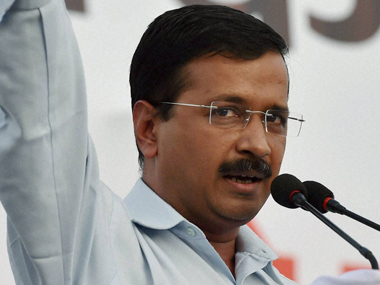Julius Caesar ordered Rome roads to be cleared of carriages other than those ferrying the royalty, clergy and officials. That was for the convenience of the elite and people in high places. Today many countries of the world resort to road space rationing to attain more altruistic purposes – reducing vehicular pollution and traffic congestion.[caption id=“attachment_2522128” align=“alignleft” width=“380”]  Delhi Chief Minister Arvind Kejriwal. PTI[/caption] The Delhi Chief Minister Arvind Kejriwal though has chosen to act on being upbraided by the Delhi High Court – people of Delhi are living in gas chambers. His knee-jerk reaction was to clear the Delhi roads of vehicular traffic by half the number of private cars, come 1 January 2016. Even number bearing cars and the ones bearing odd numbers would take turns on alternate days. Beijing resorts to road rationing with its ruthlessly efficient police force’s writ running. Here in Delhi, however, the Kejriwal government is constantly at loggerheads with the Centre. Delhi Police, including those manning traffic, come under the Central control which for all one knows might not do Kejriwal’s bidding if only to spite him. The traffic police in many of the Latin American countries employ overhead cameras to capture smartly the number plates of cars that had no business to be on roads at a given point of time pursuant to the road rationing policy. Kejriwal, who hasn’t been able to install CCTV at crucial points to prevent crime, would be at his wits’ end finding the resources to install smart overhead cameras on every traffic signals in Delhi in a record time of less than a month given the roll out of his plan is scheduled for the new year day. In a city chock-a-block with private cars that outnumber cars in the other three metropolitan cities, it would be well nigh impossible to enforce the rule manually even if somehow the Central government and the peeved Delhi Police – who are still chafing at his thulla remark – are brought around. Most of the car owners are well heeled and reluctant to use public transport. Many of them would go for a second car with a number plate that allows them to use both the cars on alternate days without falling foul of the law. And the intrepid ones would take the risk of falling foul of the law by tampering with the last digit, smug in the belief if caught they would bribe their way through. Indeed the honest traffic police in Delhi would be having a tough time hauling up the offending cars and their drivers and the corrupt ones would be having a field day, lining their pockets happily. The bumper to bumper traffic Delhi is witness to might well come to a standstill with honest or corrupt police personnel waving down the offending cars. Registration of cars at the neighbouring Noida and Gurgaon could become the preferred choice of the upwardly mobile and those who are compulsive drivers given the fact that cars bearing registration numbers given by other states would be left severely alone under the proposal. Apart from the sheer impossibility of enforcement unless equipped with smart devices, there would untold and countless inconveniences galore. Employees would not be able to make it on time to offices in the absence of an effective public transport system on routes not covered by the Delhi metro. Patients may have to call ambulance if they fall sick on the day that is not theirs on the roads. Families would sulk if they are unable to make it to parties and functions taking place unfortunately again on days not theirs on the Delhi roads. Taxi drivers and auto rickshaw drivers who incidentally are Kejriwal’s big supporters would lap up the business that comes their way thanks to denial of access to private cars every alternate day. One hopes he at least relents during non-peak hours. Night brings with it, enormous challenges especially for the old and the sick. Heart attack has the knack of striking at wee hours of morning. Tightening the anti-pollution norms makes greater sense. Euro 6 norms can be enforced on Delhi roads with heavy penalty for violations both for the car owners and the winking police. Kejriwal might even rethink his proposal in a limited way – allow HOVs or high occupancy vehicles. In Washington, for example, a car with two occupants makes the grade for this description and is allowed to enter the left most lane so it can zip past. Kejriwal can mandate four instead. The per capita pollution, case for which is constantly made by India and China in international climate forums, by a HOV would be that much less. It would also incidentally find adherents to car pooling.
Most of the car owners are well heeled and reluctant to use public transport. Many of them would go for a second car with a number plate that allows them to use both the cars on alternate days without falling foul of the law.
Advertisement
End of Article


)

)
)
)
)
)
)
)
)



